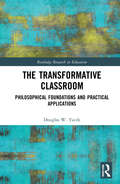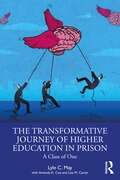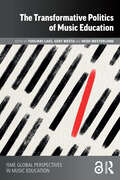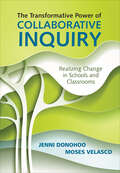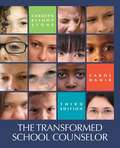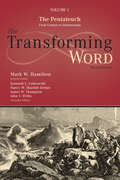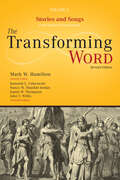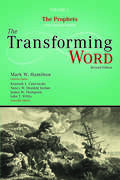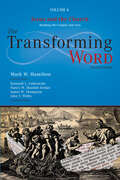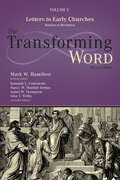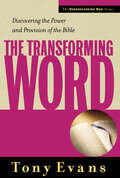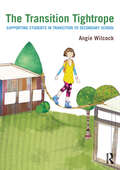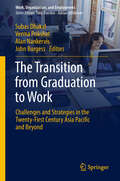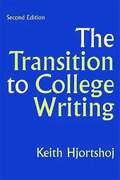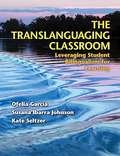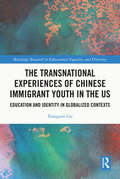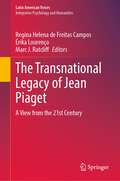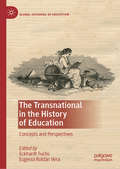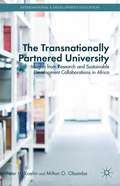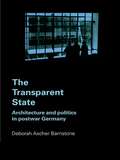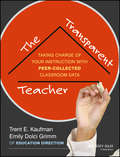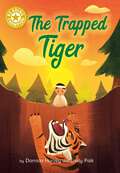- Table View
- List View
The Transformative Classroom: Philosophical Foundations and Practical Applications (Routledge Research in Education)
by Douglas W. YacekTransformative approaches to teaching and learning have become ubiquitous in education today. Researchers, practitioners and commentators alike often claim that a truly worthwhile education should transform learners in a profound and enduring way. But what exactly does it mean to be so transformed? What should teachers be transforming students into? Should they really attempt to transform students at all? The Transformative Classroom engages with these questions left open by the vast discussion of transformative education, providing a synthetic overview and critique of some of the most influential approaches today. In doing so, the book offers a new theory of transformative education that focuses on awakening and facilitating students’ aspiration. Drawing on important insights from ethics, psychology, and the philosophy of education, the book provides both conceptual clarity and concrete practical guidance to teachers who hope to create a transformative classroom. This book will be of great interest for academics, K-12 teachers, researchers and students in the fields of curriculum and instruction, teaching and learning, adult education, social justice education, educational theory and philosophy of education.
The Transformative Journey of Higher Education in Prison: A Class of One
by Lisa M. Carter Lyle C. May Amanda K. CoxThis volume follows one man’s revolutionary journey from deficient early education to his incarceration on North Carolina’s death row, where he was given the opportunity to pursue higher education.By pairing Lyle May‘s engaging first-person account with current scholarly literature, this book examines the complex relationship between the United States’ educational and penal systems. It also documents the role of education in May’s contributions to society through writing, teaching, and activism. Flouting the stereotype that people sentenced to long prison terms lack an ability or desire for higher education, May’s experience champions individualism as a means of overcoming most environmental challenges to learning, personal growth, and societal involvement. With the right amount of motivation and dedication, even prison walls do not preclude significant contributions to the community or participation in criminal justice reform. Granting access to higher education in places that often lack an academic apparatus, Ohio University’s College Program for the Incarcerated provides an avenue for correctional students to enroll in accredited correspondence courses and earn an Associate or Bachelors of Specialized Studies degree. This book’s recounting of May’s experience with the program augments existing literature on higher education in prison by illustrating the tragic but common pitfall of the school-to-prison pipeline and one man’s determination to pursue higher education despite the hindrances inherent in the prison environment.Informing both students and educators about aspects of prison life that are not always considered, this book is a valuable component of a well-rounded corrections course reading list. It is essential for educators and students, criminal justice reformers, criminologists, penologists, or any reader intent on understanding how independent learning is critical to unlocking the rehabilitative and reintegrative potential of higher education in prison.
The Transformative Mind
by Anna StetsenkoThe book suggests a transition from a relational worldview premised on the socio-political ethos of adaptation towards a transformative worldview premised on the ethos of solidarity and equality. Expansively developing Vygotsky's revolutionary project, the Transformative Activist Stance integrates insights from a vast array of critical and sociocultural theories and pedagogies and moves beyond their impasses to address the crisis of inequality. This captures the dynamics of social transformation and agency in moving beyond theoretical and political canons of the status quo. The focus is on the nexus of people co-creating history and society while being interactively created by their own transformative agency. Revealing development and mind as agentive contributions to the 'world-in-the-making' from an activist stance guided by a sought-after future, this approach culminates in implications for research with transformative agendas and a pedagogy of daring. Along the way, many key theories of mind, development and education are challenged and radically reworked.
The Transformative Politics of Music Education (ISME Series in Music Education)
by Gert Biesta Heidi Westerlund Tuulikki LaesThis book introduces a unique approach to the interconnections between music education and politics. By taking a broader, more diverse, and explicitly ethico-political philosophical and theoretical stance, the book challenges institutional and structural conditions that may be resistant to change and expands the understanding of the professional responsibility of music educators in the 21st century to meet a variety of societal and ecological challenges.Emerging from a collaboration between international music education scholars and prominent contemporary educational theorist Gert Biesta, this book connects contemporary educational theories with music education to unlock its transformational capacity. In eight chapters, the contributors show how music education can move towards ways of being and doing that are attuned to social justice and to the broader social and ecological responsibility of music professionals. Strengthening the interdisciplinary connections between music education and education, philosophy, sociology, policy, systems thinking, and more, the volume offers a renewed vision of the scope and boundaries of both music teacher education and professional work in music more widely.Connecting the decades-long work of internationally established music educator scholars and ideas from large-scale research projects with a shared interest in transformative theorisation, this book fills a knowledge gap and reframes the philosophy of music education as a vibrantly multidisciplinary, theory-generating field. Relevant to researchers and students across music teacher education and performance studies, this book speaks to both conservatoires and university contexts across Europe and North America, helping us unlock the transformative capacity of music education.
The Transformative Power of Collaborative Inquiry: Realizing Change in Schools and Classrooms
by Jenni Anne Donohoo Moses VelascoFoster reflective teacher leadership and make real change happen! Teachers are powerful change agents in the on-going process of school improvement. This insightful, must-read guide helps school leaders shape the development of a sustainable professional learning culture. Practical suggestions and in-depth research shed light on your path as you explore the benefits and challenges of adopting authentic teacher collaboration across schools and districts. A follow-up to Jenni Donohoo’s best-selling Collaborative Inquiry for Educators: A Facilitator′s Guide to School Improvement, this book will quickly move you from theory to practice. Learn valuable lessons from leaders’ experiences in the field and discover: A rationale and framework for engaging in inquiry The vital conditions needed to ensure systemwide collaboration Common pitfalls and the four stages of school improvement Included are Cardwork Strategies with explicit actions and phrases to improve professional practice. Use this insightful guide to develop teacher leaders who lead and learn productively! "The concept of collaborative inquiry is increasingly bandied about these days with little precision. In one fell swoop, Donohoo and Velasco change all that with this succinct, hard hitting, complete, powerful, and, above all, accessible book on collaborative inquiry." —Michael Fullan, Professor Emeritus OISE/University of Toronto "Donohoo and Velasco guide readers through an inquiry process that can strengthen every professional learning community. They provide the ‘how’ to teacher collaboration and shine light on the path that will get us all there." —Douglas Fisher, Professor San Diego State University
The Transformative Power of Collaborative Inquiry: Realizing Change in Schools and Classrooms
by Jenni Anne Donohoo Moses VelascoFoster reflective teacher leadership and make real change happen! Teachers are powerful change agents in the on-going process of school improvement. This insightful, must-read guide helps school leaders shape the development of a sustainable professional learning culture. Practical suggestions and in-depth research shed light on your path as you explore the benefits and challenges of adopting authentic teacher collaboration across schools and districts. A follow-up to Jenni Donohoo’s best-selling Collaborative Inquiry for Educators: A Facilitator′s Guide to School Improvement, this book will quickly move you from theory to practice. Learn valuable lessons from leaders’ experiences in the field and discover: A rationale and framework for engaging in inquiry The vital conditions needed to ensure systemwide collaboration Common pitfalls and the four stages of school improvement Included are Cardwork Strategies with explicit actions and phrases to improve professional practice. Use this insightful guide to develop teacher leaders who lead and learn productively! "The concept of collaborative inquiry is increasingly bandied about these days with little precision. In one fell swoop, Donohoo and Velasco change all that with this succinct, hard hitting, complete, powerful, and, above all, accessible book on collaborative inquiry." —Michael Fullan, Professor Emeritus OISE/University of Toronto "Donohoo and Velasco guide readers through an inquiry process that can strengthen every professional learning community. They provide the ‘how’ to teacher collaboration and shine light on the path that will get us all there." —Douglas Fisher, Professor San Diego State University
The Transformed School Counselor
by Carol A. Dahir Carolyn StonePreparing readers for real-world practice, THE TRANSFORMED SCHOOL COUNSELOR, Third Edition demonstrates how to effectively use theories, data-driven decision-making, leadership, advocacy, and consultation to improve clients' scholastic achievement and foster social justice. <P><P>Thoroughly integrating the ASCA National Model throughout, the book provides an excellent overview of how the school counseling profession has transformed to successfully meet the needs of 21st-century students. <P><P>It challenges pre-service counselors to view their sphere of influence from a systemic perspective and develop awareness of the major societal and educational changes impacting the school counselor--including economy, technology, family structures, standards-based education, and diversity. <P><P>Completely current and aligned with 2016 CACREP standards, the third edition is packed with new case studies, Voices from the Field insights, the latest data available, and real-world illustrations.
The Transforming Word Series, Volume 1: The Pentateuch: From Genesis to Deuteronomy
by Mark HamiltonGod reveals his true nature in the first five books of the Bible.While the broader story of the Bible is known to many Christians, careful readers of the Pentateuch still have many questions. The origin story of the Jewish nation is one of hardship and loss. The Transforming Word will encourage you to examine the Scriptures and discover the God who sustains everything.
The Transforming Word Series, Volume 2: Stories and Songs: From Joshua to Song of Songs
by Mark HamiltonThe nation of Israel tells its story of the rise of kings not once but twice (Joshua–2 Kings, 1–2 Chronicles); and during this period, they wrote Psalms and gathered together their wise sayings. Then, plunged into the darkness of exile, they had to discover again who God was and what kind of life he called them to live. In the same way, Christians read these texts today for what they share about a promised Messiah and how they explain what life with God looks like in all its complexity.
The Transforming Word Series, Volume 3: The Prophets: From Isaiah to Malachi (The Transforming Word #3)
by Mark HamiltonExplore God's vision for a better worldSometimes near the king and the temple courts and at other times on the fringes of society, God's people have always had their social critics. The prophets sought to call everyone back to God's original design. Their call for justice and mercy and their warnings of impending judgment were later echoed by Jesus. One can't know him without hearing what the prophets were saying to the people.Based on the best of recent scholarship, this volume in the Transforming Word series takes the relevance of the prophets seriously and encourages readers with a deeper understanding of their message and calling.
The Transforming Word Series, Volume 4: Jesus and the Church: Reading the Gospels and Acts (The Transforming Word #4)
by Mark HamiltonThe life and work of Jesus Christ must not be overlooked.Born under Roman occupation, Jesus lived his entire life without writing anything down. His earliest followers, the Christians that were shaped by his life and teachings, carefully recorded his words as good news. They also experienced his resurrection and believed that he had entrusted them with a mission to transform the world.
The Transforming Word Series, Volume 5: Letters to Early Churches: From Romans to Revelation (The Transforming Word #4)
by Mark HamiltonThe life and work of Jesus Christ must not be overlooked.Born under Roman occupation, Jesus lived his entire life without writing anything down. His earliest followers, the Christians that were shaped by his life and teachings, carefully recorded his words as good news. They also experienced his resurrection and believed that he had entrusted them with a mission to transform the world.
The Transforming Word: Discovering the Power and Provision of the Bible
by Tony EvansNew in paperback from the Understanding God series. Tony Evans encourages people who have read only portions of the Word to discover its transforming power. He explains the uniqueness of the Bible, how it came to be written, and the blessings and promises it contains. In his down-to-earth style, Evans encourages readers to open their Bibles and their hearts to God's message.
The Transforming Word: Discovering the Power and Provision of the Bible
by Tony EvansNew in paperback from the Understanding God series. Tony Evans encourages people who have read only portions of the Word to discover its transforming power. He explains the uniqueness of the Bible, how it came to be written, and the blessings and promises it contains. In his down-to-earth style, Evans encourages readers to open their Bibles and their hearts to God's message.
The Transition Tightrope: Supporting Students in Transition to Secondary School
by Angie WilcockThe transition phase from primary to secondary school is a time of massive personal, physical, psychological and social change. Not only is it a difficult time for the young adolescent, but it is also a challenging time for parents, teachers and anyone working with young people experiencing such substantial changes in their lives. In this highly accessible book, Angie Wilcock offers clear, practical, and realistic tips and strategies to support teachers’ and parents’ understanding of this difficult transition stage. If you are concerned that your child or pupil may have difficulty coping with the many changes and challenges associated with this phase, this book will give you insight into issues such as: understanding the developing teen and effective ways to handle them keeping up with multiple assignments creating a system of organisation and an effective work space at home maintaining a healthy balance between work, play...and sleep developing a positive attitude to school and study setting realistic goals making new friends establishing life skills which are transferable to school. Based on real-life teaching and parenting experience and full of practical, helpful case studies, this is just the resource you need to help you support and guide your developing teen.
The Transition from Graduation to Work: Challenges and Strategies in the 21st Century Asia Pacific and Beyond (Work, Organization, and Employment)
by John Burgess Subas Dhakal Verma Prikshat Alan NankervisThis book reports on the findings from a research study of vocational and higher education graduates’ employability challenges. The nature and extent of these challenges, their underlying causes, and effective strategies to address the problems in this area are all analysed from a multiple-stakeholder paradigm. The primary focus of the book is on governments; secondary, vocational, and higher education systems; and industry employers - rather than graduates themselves - in order to highlight the policy and strategy implications for governments, industry and educational systems. Readers will acquire comprehensive information on the nature and extent of graduate employability in terms of country-specific challenges, together with a deeper understanding of their complex causes, and the inter-relatedness between governments, educational systems, industry sectors, and potential employers. They will also be provided with a broad range of stakeholder strategies designed to effectively address these challenges within integrated national and regional approaches.
The Transition to College Writing
by Keith HjortshojIntroducing essential reading and writing strategies necessary for success in a variety of college courses, Transition to College Writing focuses on that shift from high school to college, offering practical strategies to shed ineffective habits and a more flexible understanding of how to respond to academic challenges.
The Translanguaging Classroom: Leveraging Student Bilingualism for Learning
by Ofelia García Susana Ibarra Johnson Kate SeltzerThe Translanguaging Classroom: Leveraging Student Bilingualism for Learning shows teachers, administrators, professional development providers, and researchers how to use translanguaging to level the playing field for bilingual students in English-medium and bilingual classrooms. The term translanguaging can be understood in two different ways. From a sociolinguistic perspective, translanguaging can be understood as the dynamic language practices of bilinguals. From a pedagogical perspective, translanguaging can be understood as an instructional and assessment framework that teachers can use strategically and purposefully to: <P><P> Support bilingual students as they engage with and comprehend complex content and texts<br> Provide opportunities for bilingual students to develop linguistic practices for academic contexts<br> Make space for students’ bilingualism and ways of understanding<br> Support bilingual students’ socioemotional development and bilingual identities<br> <P><P> García, Ibarra Johnson, and Seltzer illustrate their translanguaging pedagogy in action with examples from three very different contexts: a 5th-grade dual-language bilingual class taught by a bilingual teacher in New Mexico, an 11th-grade English-medium social studies class serving a predominantly Latino classroom taught by an English monolingual teacher in New York, and a 7th-grade ESL teacher working with students from a variety of linguistic and cultural backgrounds in California. Teachers learn to use translanguaging for instruction and assessment to meet and exceed content and language development standards in their classrooms.
The Transnational Experiences of Chinese Immigrant Youth in the US: Education and Identity in Globalized Contexts (Routledge Research in Educational Equality and Diversity)
by Xiangyan LiuDetailing ethnographic research conducted in U.S. public high schools, this text considers how Chinese immigrant youth's educational positionality and identity are shaped by diasporic and transnational migrant experiences. The Transnational Experiences of Chinese Immigrant Youth in the US presents a critical examination of themes relevant to Chinese immigrant education such as academic achievement, English language proficiency, and cultural and social capital. The intersection between diaspora and education is explored to highlight the existence of multi-layered youth identities, which exist beyond and between national boundaries, and which embody the concept of global citizenship. Building on this realization, chapters consider how institutional structures might be better designed to meet the needs of students who arrive in host countries due to larger global forces. This text will primarily be of interest to doctoral students, researchers, and scholars with an interest in multicultural education and the sociology of education. Those interested in the Asian diaspora, race and ethics, and educational research methods more broadly will also benefit from this volume.
The Transnational Legacy of Jean Piaget: A View from the 21st Century (Latin American Voices)
by Marc J. Ratcliff Regina Helena de Freitas Campos Érika LourençoThis book presents a collection of studies on the circulation of Jean Piaget’s ideas and works between Europe and Latin America, and how this transnational legacy influenced different fields of research and practice, such as psychology, education and philosophy. The volume brings together contributions presented at the International Colloquium Jean Piaget in Brazil and Latin America, held during the 38th Annual Helena Antipoff Meeting, organized by the Federal University of Minas Gerais, Brazil, in collaboration with the University of Geneva, Switzerland. The book is organized in three parts. Chapters in the first part analyze Piaget’s role as a builder of an international network in psychology, education and peace promotion in the 20th century, with a special focus on the circulation of his ideas and works between Switzerland and France. The second part focuses on historical and contemporary dialogues, conflicts and controversies between Piaget and other authors, such as Henri Wallon, Carl Rogers, Jürgen Habermas, and, especially, Helena Antipoff, the Russian-Brazilian psychologist and educator who was one of the first researchers to introduce Piaget in Brazil and to establish a bridge between Latin America and the Geneva school of psychological and educational sciences. Finally, chapters in the third part of the book explore different aspects of the reception and appropriation of Piaget’s works and ideas in the Brazilian context. The Transnational Legacy of Jean Piaget: A View from the 21st Century will be of interest to researchers in different fields within the human and social sciences, such as developmental, educational and school psychologists; educators; philosophers and historians of psychology and education interested in understanding how Piaget’s progressist ideas have contributed to the development of psychological and educational sciences in Europe and Latin America. Some chapters of this book were originally written in Portuguese and French and translated into English with the help of artificial intelligence. A subsequent human revision was done primarily in terms of content.
The Transnational in the History of Education: Concepts and Perspectives (Global Histories of Education)
by Eckhardt Fuchs Eugenia Roldán VeraThis edited volume reflects on how the “transnational” features in education as well as policies and practices are conceived of as mobile and connected beyond the local. Like “globalization,” the “transnational” is much more than a static reality of the modern world; it has become a mode of observation and self-reflection that informs education research, history, and policy in many world regions. This book examines the sociocultural project that the “transnational turn” evident in historical scholarship of the last few decades represents, and how a “transnational history” shapes how historians construct their objects of study. It does so from a multinational perspective, yet with a view of the different layers of historical meanings associated with the concept of the transnational.
The Transnationally Partnered University
by Peter H. Koehn Milton O. ObambaAnalyzing the growing importance of the transnational higher education landscape and the role of African universities, Koehn and Obamba show how transnational partnerships among universities can inform policy, strengthen synergies between knowledge producers and knowledge users, and advance sustainable-development practice.
The Transparent State: Architecture and Politics in Postwar Germany
by Deborah Ascher BarnstoneExamining the transformation of transparency as a metaphor in West German political thought to an analogy for democratic architecture, this book questions the prevailing assumption in German architectural circles that transparency in governmental buildings can be equated with openness, accessibility and greater democracy.The Transparent State traces the development of transparency in German political and architectural culture, tying this lineage to the relationship between culture and national identity, a connection that began before unification of the German state in the eighteenth century and continues today. The Weimar Republic and Third Reich periods are examined although the focus is on the postwar period, looking at the use of transparency in the three projects for a national parliament - the 1949 Bundestag project by Hans Schwippert, the 1992 Bundestag building by Gunter Behnisch and the 1999 Reichstag renovation by Norman Foster.Transparency is an important issue in contemporary architectural practice; this book will appeal to both the practising architect and the architectural historian.
The Transparent Teacher: Taking Charge of Your Instruction with Peer-Collected Classroom Data
by Trent Kaufman Emily GrimmA new paradigm for teachers to open their classrooms and cultivate deep professional learning Teaching is an isolating profession. Most educators receive minimal feedback on their craft, typically limited to one or two short visits from the administrator each year. While some schools do encourage their teachers to observe peers, the usual protocol is for new teachers to watch the veteran, exemplary educators, but those less experienced educators could benefit immensely from having peers observe them in action. Teacher-Driven Observation is unique in that it places the observed teacher as leader of the work, the one who identifies a personal area for development, engages her colleagues in the collection of classroom data, and utilizes the data collected to inform her ongoing instruction. Offers a new model for collecting data to inform and improve individual instruction Includes a step-by-step process for implementing Teacher-Driven Observations Contains a comprehensive case study that clearly demonstrates the value of the Teacher-Driven Observation model This book outlines and illustrates a step-by-step process for breaking down professional isolation and cultivating opportunities for meaningful learning through the Teacher-Driven Observation process.
The Trapped Tiger: Independent Reading Gold 9 (Reading Champion #1076)
by Damian HarveyIn this world tale from Korea, Tiger tries to trick a young boy into helping him escape a pit. But Tiger soon discovers the cost of breaking a promise...This story is part of Reading Champion, a series carefully linked to book bands to encourage independent reading skills, developed with Dr Sue Bodman and Glen Franklin of UCL Institute of Education (IOE)Fantastic, original stories are accompanied by engaging artwork and a reading activity. Each book has been carefully graded so that it can be matched to a child's reading ability, encouraging reading for pleasure. Perfect for 5-7 year olds or those reading book band gold.
